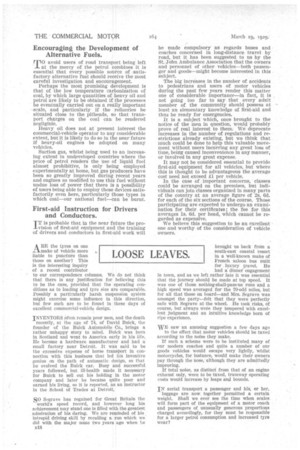Encouraging the Development of Alternative Fuels.
Page 44

If you've noticed an error in this article please click here to report it so we can fix it.
MO avoid users of road transport being left at the mercy of the petrol combines it is essential that every possible source of satisfactory alternative fuel should receive the most careful investigation and encouragement.
Perhaps the most promising development is that of the low temperature carbonization of coal, by which large quantities of heavy oil and petrol are likely to be obtained if the processes be eventually carried out on a really important -scale, and particularly if the refineries be situated close to the pitheads, so that transport charges on the coal can be rendered Heavy oil does not at present interest the commercial-vehicle operator to any considerable extent, but it is likely to do so in the near future if heavy-oil engines be adopted on many vehicles.
Suction gas, whilst being used to an increasing extent in undeveloped countries where the price of petrol renders the use of liquid fuel almost prohibitive, is only being employed experimentally at home, but gas producers have been so greatly improved during recent years and engines so modified to use this fuel without undue loss of power that there is a possibility of users being able to employ these devices satisfactorily even here, particularly those types in which coal—our national fuel—can be burnt.




















































































































